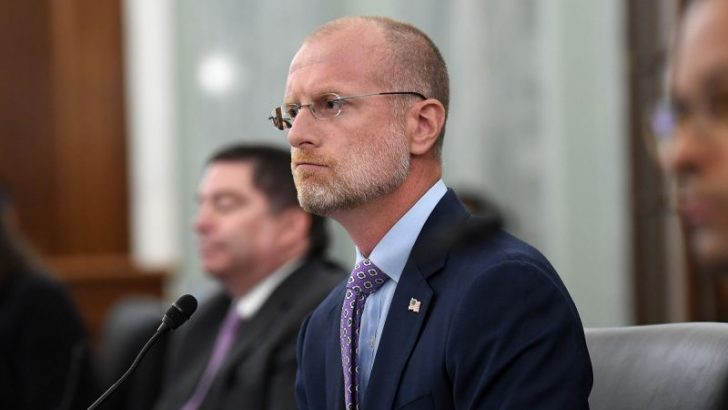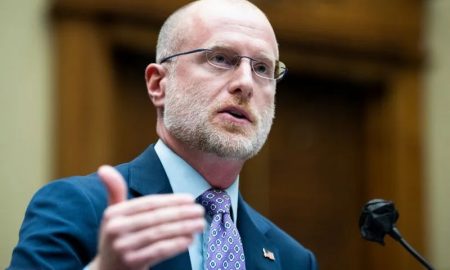
Net Neutrality Debate Reignites As Trump Names Brendan Carr to Lead FCC

Donald Trump has nominated Brendan Carr, a net neutrality critic, to lead the Federal Communications Commission (FCC). The nomination signals a potential shift in the regulatory body’s direction, reigniting debates on the future of internet regulation in the United States. Known for his staunch deregulatory stance, Carr’s leadership could mark a return to the policies championed by former FCC chair Ajit Pai.
Brendan Carr’s nomination as FCC chair comes with a clear agenda. A long-time opponent of net neutrality, Carr has consistently argued against government regulations on internet service providers (ISPs). During his tenure as an FCC commissioner, he supported the controversial repeal of net neutrality rules in 2017. Established in 2015, these rules aimed to prevent ISPs from prioritizing certain types of internet traffic or charging for faster access.

Marca / Carr’s nomination as FCC chair follows the leadership of Jessica Rosenworcel, a Democrat whose focus on consumer protections stood in sharp contrast to Carr’s deregulatory philosophy.
While Rosenworcel prioritized fair access and transparency, Carr emphasizes free-market competition as the best way to improve internet services. His alignment with Trump and Ajit Pai suggests a regulatory rollback is on the horizon.
Why Carr’s Nomination Matters So Much
Trump’s FCC chair pick has reignited the ideological clash over how the internet should be governed. Carr believes ISPs should have the freedom to manage their networks without heavy-handed government interference. He argues that regulations like net neutrality discourage investment in broadband infrastructure, ultimately hurting consumers in underserved areas.
However, Critics of Carr’s approach fear it could allow ISPs to exploit their control over internet access. Without net neutrality, providers could charge more for access to certain websites or slow down competitors’ content. Thus, this raises concerns about fairness, innovation, and equal access to information.
Does Carr Have a Consumer Protection Solution?
Although Carr opposes net neutrality, he advocates for greater transparency from ISPs. He suggests that consumers should know how their data is used, which services are prioritized, and how pricing structures are determined. Transparency, he argues, is key to ensuring accountability in a deregulated market.
Carr’s transparency push also extends to Big Tech. He believes large technology companies should face similar scrutiny regarding how they handle user data and manage online platforms. By broadening the focus of regulation, Carr aims to balance the scales between ISPs and tech giants, ensuring consumers have clear information about their online experiences.
Deregulation and Free-Market Competition
Carr champions the idea that competition among ISPs will naturally drive better service and pricing. He argues that imposing strict rules limits innovation and discourages companies from improving their networks.

Sky News / According to Carr, a free-market system incentivizes ISPs to invest in infrastructure and offer competitive pricing to attract customers.
But the reality of competition in the broadband market complicates this narrative. Many regions in the U.S. have limited options for high-speed internet, leaving consumers with few choices. Critics argue that without strong regulations, ISPs in these areas could exploit their monopolies, raising prices or slowing down certain types of content.
The Net Neutrality Debate Resurfaces
Trump’s FCC chair nomination has brought the net neutrality debate back into the spotlight. Proponents of net neutrality argue it ensures a level playing field for all internet users. Without it, they say, ISPs could create a tiered internet where only those who can pay extra get fast and reliable service.
Carr and other opponents counter that these rules stifle growth. They argue that ISPs need the freedom to manage their networks effectively, which could include charging for premium services. In their view, deregulation fosters innovation and encourages investment in broadband expansion.
More in Tech
-
`
The Petrodollar & Saudi Arabia: Surprising Facts You Need to Know
Petrodollar Saudi Arabia is a term that has long been associated with the unique financial arrangement between Saudi Arabia and the...
July 4, 2024 -
`
What Is Generative AI vs AI – And How Do They Differ?
In the ever-evolving landscape of artificial intelligence (AI), the line between science fiction and reality continues to blur. Chatbots seamlessly navigate...
June 28, 2024 -
`
What Quarters Are Worth Money? Tips to Identify Valuable Coins Today
In coin collecting, certain quarters stand out not just for their face value but for their potential worth, much beyond that....
June 21, 2024 -
`
How Does the Hubble Telescope Work and Where Is It?
Have you ever gazed at the night sky and marveled at the twinkling stars and wispy clouds of gas and dust?...
June 15, 2024 -
`
5 Savings Accounts That Will Earn You the Most Money in 2024
In 2024, choosing the right savings account is more critical than ever. With the array of options available, knowing which savings...
June 5, 2024 -
`
The Complete Relationship Timeline of Taylor Swift & Travis Kelce
When you think of unlikely couples, Taylor Swift and Travis Kelce might not be the first pair that comes to mind....
May 29, 2024 -
`
What is Business Administration and What Opportunities Does it Offer?
In today’s bustling world of commerce and industry, the term “business administration” often looms large, yet its true essence remains shrouded...
May 22, 2024 -
`
What is AI? Exploring the World of Artificial Intelligence
In today’s rapidly evolving technological landscape, the term “Artificial Intelligence” (AI) has become a buzzword that sparks curiosity, speculation, and even...
May 16, 2024 -
`
How Many Jobs Are Available in Real Estate Investment Trusts? Exploring Career Opportunities
Are you seeking a career path with a blend of financial savvy and a knack for the real estate market? Look...
May 9, 2024















You must be logged in to post a comment Login